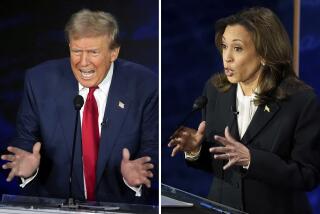Democratic Candidates Hail Missile Pact : 6 Debaters Welcome New Treaty as a First Step in Disarmament
- Share via
NEW YORK — The six Democratic presidential contenders, meeting in the shadow of the superpower summit Thursday for their 13th debate, used the occasion to hail the treaty on eliminating intermediate-range nuclear missiles as a first step in disarmament.
The Rev. Jesse Jackson suggested that the missiles be destroyed publicly, in “a massive TV ceremony.”
“It’s a small step for mankind and a giant step for Reagan,” Jackson said of the accord. “We must go further to reduce these nuclear weapons.”
“Every one of us supports that agreement,” said Massachusetts Gov. Michael S. Dukakis, noting that only Vice President George Bush has enthusiastically supported the treaty among the six Republican candidates.
Cuomo Serves as Host
The 1 1/2-hour debate was hosted by New York Gov. Mario M. Cuomo, who has said he will not be a candidate for the Democratic nomination. Cuomo was praised by the candidates, who clearly sought his endorsement. But Cuomo, who is still mentioned as a possible candidate if none of the six Democrats emerge as a strong leader this spring, has said he would not voice any choice--if at all--until after the New York primary in April.
Sen. Paul Simon of Illinois said at the debate that if elected he would, in his first day in office, propose to the Soviets a halt to all nuclear warhead testing.
Former Arizona Gov. Bruce Babbitt, calling the treaty “a nice start,” also said he would seek a test ban treaty and further arms reductions.
Babbitt said he would strive for agreements limiting superpower intervention in Third World nations and establishing a development fund for the Third World. The American response to Soviet willingness to negotiate should be, “We’ll see you and we’ll raise you,” he said.
Sen. Albert Gore Jr. of Tennessee said he, too, would seek to cut strategic as well as shorter-range nuclear missile arsenals but said it was equally important to reduce fear and mistrust on both sides.
Gephardt Predicts Victory
The accord among the candidates on arms control followed a prediction at the start of the debate by Missouri Rep. Richard A. Gephardt that the Democrats would win the 1988 election “because we’re going to stand for change.”
The tone of the debate was not contentious, rather explanatory, as each candidate took pains to put behind him issues that could prove troublesome once caucuses and primaries begin.
After weeks of being criticized for not listing specifics of how he would balance the budget, Simon said by his third year in the White House he would cut military spending by 6% resulting in a reduction of $20 billion. He said he would seek to lower interest rates and through private initiatives would seek to lower the trade deficit by one-third resulting in a $45-billion budget savings.
He said he would urge new taxes only as a last resort.
Gore who has made military strength a centerpiece of his campaign, was asked if he endorsed President Reagan’s invasion of Grenada. “I do believe it was justified,” Gore said, but he said he would stop short of sending troops to troubled Haiti, explaining the Organization of American States was considering setting up a multilateral force.
Jackson, who has faced continuing charges that he cannot be elected, repeated that “if I can win this political and moral challenge, any American can.”
Delivers One Jab
Jackson delivered one jab, in a reference to his efforts to register voters during his 1984 Democratic campaign.
“Many on this stage in 1984 turned to Reaganomics,” Jackson declared. “I turned to registration. And that’s why we’ve got a Democratic Senate.”
As he did in the last debate, Babbitt stood up on stage, and called for new taxes to battle the federal budget deficit. The alternative is “to acquiesce in a lie, to maintain a kind of a conspiracy of silence,” he said.
Babbitt tried to expand on the approach by asking the audience of 3,000 to rise with him. Only a handful complied.
“Well, I didn’t get all of you,” he conceded. “I know New York’s a tough sell and I’ll be back to have every one of you before next April.” The state’s primary is April 19.
One of the debate’s few sparks came when Babbitt took on Dukakis’ plan to hire new tax collectors to help balance the budget. “He wants to hire 30,000 new revenue collectors to collect this phantom $100 billion which is stuffed under mattresses all over the country,” Babbitt chided.
“Paul Simon wants to spend 10-20 billion bucks for a public works program,” he said. “I think that what we should do is take Paul’s $10 billion to hire Mike’s tax collectors.”
Refers to Scandal
Gephardt repeated a line he had used since last summer, charging the Reagan Administration has “put the Constitution through a shredder,” referring to the Iran-Contra scandal.
AIDS also emerged as an issue as AIDS activists shouted from the audience for attention to the problem. Both Gore and Jackson called for expenditures of up to $16 billion a year to fight the AIDS epidemic.
“Yes, absolutely, my Administration would pay for it,” Gore said.
More to Read
Get the L.A. Times Politics newsletter
Deeply reported insights into legislation, politics and policy from Sacramento, Washington and beyond. In your inbox twice per week.
You may occasionally receive promotional content from the Los Angeles Times.










